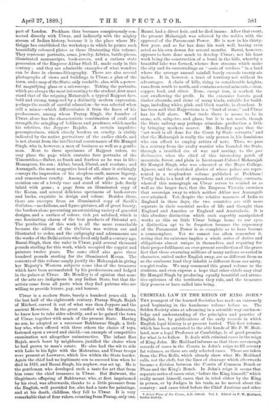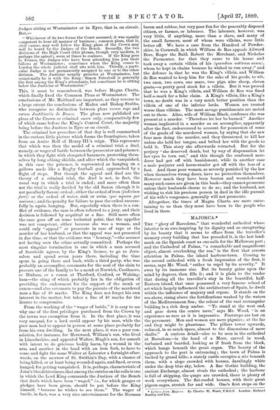CRIMINAL LAW IN THE REIGN OF KING JOHN.* THE youngest
of the learned Societies has made an extremely good beginning in the handsome volume before us. The Selden Society aims at advancing in a scientific way our know- ledge and understanding of the principles and practice of English law, by publications of the early records in which English legal history is at present buried. This first volume, which has been entrusted to the able hands of Mr. F. W. Mait- land, now a legal Professor at Cambridge, is of good promise for what is to follow. It deals with criminal cases in the reign of King John. Mr. Maitland informs us that there are enough records of cases in the Courts in John's reign to fill seventy fat volumes, so these are only selected cases. These are taken from the Plea Rolls, which already show what Mr. Maitland calls, not the cleft, but the lines of cleavage which afterwards became a division between the Courts of Common Bench or Pleas and the King's Bench. In John's reign it seems that separate series of cases exist, "before the King himself," which really meant himself, cases, that is, tried either by the King in person, or by Judges in his train, as he moved about the country : and cases tried before the Chief Justiciar and other
• Select Pleas of the Crown, A.D. 1200-85. Vol. L Edited by F. W. Maitland, Selden Society.
Judges sitting at Westminster or in Eyre, that is, on circuit.
But,- " Whichever of its two forms the Court assumed, it was equally competent to hear all manner of business ; common pleas, that is, civil causes, may well follow the King, pleas of the Crown may well be heard by the Judges of the Bench. Secondly, the two divisions of the High Court (this phrase, though very modern, is perhaps the aptest), seem at times to coalesce. If the King goes to France, the Judges who have been attending him join their fellows at Westminster ; sometimes when the King comes to London the whole judicial staff sits with him. Thirdly, a parti- cular Judge is not permanently assigned to one or to the other division. The Justiciar usually presides at Westminster, but occasionally he is with the King : Simon Pateshull is generally the first among the King's attendants, but sometimes he is sitting below the Justiciar at Westminster."
This, it must be remembered, was before Magna Charta, which finally fixed the Common Pleas at Westminster. The conclusions of Mr. Maitland are important, as they reverse to
a large extent the conclusions of Madox and Bishop Stubbs, who recognise no distinction between pleas coram rege and
coram Justitiariis de Banco. The pleas now published are pleas of the Crown or criminal cases only, comparatively few of which came before the King's Central Court, the majority being before the Justices in Eyre or on circuit.
The criminal law procedure of that day is well summarised in the curious little picture which forms the frontispiece, taken from an Assize Roll of Henry III.'s reign. This represents that which was then the model of a criminal trial, a duel, namely, or wager of battle between the prosecutor and prisoner, in which they fight with elongated hammers, protecting them- selves by long oblong shields, and after which the vanquished, in this case the prisoner, is represented as hanging on a gallows made like a Rugby football goal, approached by a flight of steps. But though the appeal and duel are the theory of a criminal trial, the duel is not, in fact, the usual way in which a trial is ended ; and more often than not the trial is really decided by the old Saxon (though it is not peculiarly Saxon) ordeal ; either the ordeal of iron (judicium fern) or the ordeal of water, sink or swim (per aquam per assisam), and the penalty for failure to pass the ordeal success- fully is, again, hanging. But, especially when there is a con- filet of evidence, the case is often referred to a jury, and their decision is followed by acquittal or a fine. Still more often the case goes off on some technical point, that the appellor was not competent, either because she was a woman, and could only " appeal " or prosecute in case of rape or the murder of her husband, or that the appeal was not presented in due time, or that the evidence was "hearsay,"—the accuser not having seen the crime actually committed. Perhaps the most singular termination is one in which a man accused of fratricide agrees, by the King's licence, to go to Jeru- salem and spend seven years there, including the time spent in going there and back, while a third party, who was probably an accomplice, covenants for the soul of the slain to procure one of the family to be a monk at Norwich, Castleacre, or Binham, or a canon at Thetford, Coxford, or Walsing- ham—the sting of which probably lies in the obligation of providing the endowment for the support of the monk or canon—and also covenants to pay the parents of the murdered man a fine of 40 marks. The King does not forget his own interest in the matter, but takes a fine of 40 marks for the licence to compromise.
From the working of the "wager of battle," it is easy to see why one of the first privileges purchased from the Crown by the towns was exemption from it. In the first place, it was very unequal, for a lord could appear by his man, while the poor man had to appear in person at some place probably far from his own dwelling. In the next place, it was a poor con- solation, for instance, for Hereward, William's son, who lived in Lincolnshire, and appealed Walter, Hugh's son, for assault with intent to do grievous bodily harm, by a wound in the arm and another in the head with an iron fork, to have to come and fight the same Walter at Leicester a fortnight after- wards, on the morrow of St. Swithin's Day, with a chance of being killed, or at least being wounded again, and fined, or even hanged, for getting vanquished. It is, perhaps, characteristic of John's bloodthirstiness, that among the entries on the rolls is one in which the Lord King commands the Justices of the Bench that duels which have been " waged," i.e., for which gauges or pledges have been given, should be put before the King himself, " because he wishes to see them." The wager of battle, in fact, was a very nice entertainment for the Norman
baron and robber, but very poor fun for the peaceably disposed • citizen, or farmer, or labourer. The labourer, however, was very little, if anything, more than a slave, and many of the small farmers, most of whom were villeins, were little better off. We have a case from the Hundred of Powder- shire, in Cornwall, in which William de Ros appeals Ailward Bere, Roger the Bald, Robert the Merchant, and Nicholas the Parmenter, for that they came to his house and took away a certain villein of his (quendam nativum suum), whom he kept in chains because he wished to run away ;" and the defence is, that he was the King's villein, and William de Ros wanted to keep him for the sake of his goods, to wit, two oxen, two cows, one mare, two pigs, nine sheep, eleven goats,—a pretty good stock for a villein. But it was proved that he was a King's villein, and William de Ros was fined half-a-mark for a false claim. A King's villein, like a King's town, no doubt was in a very much better position than the villein of one of the inferior lords. Women are treated worse than villeins. The most savage punishments are meted out to them. Alice, wife of William Black, confesses she was present at a murder. "Therefore let her be burned." Another woman implicated in a murder as an accomplice, apparently after the fact, endeavoured to account for possession of some of the goods of the murdered woman, by saying that she saw four men doing the murder, and they threatened to kill her unless she held her tongue, and bribed her with the goods to hold it. This story she afterwards retracted. But for the perjury " she deserved death, but by way of dispensation let her eyes be torn out," and this though the confessed mur- derer had got off with banishment, while in another case a male perjurer and horse-stealer got off with the loss of a foot. And these poor women, so severely punished by the law when themselves wrong doers, have no protection themselves. However much they have been beaten and wounded—and many such cases are given in this book—they cannot prosecute unless their husbands choose to do so ; and the husband, not wishing to risk his precious person in duel in the idle pursuit of his wife's vengeance, generally will not prosecute.
Altogether, the times of Magna Charta are more enter- taining to us than they must have been to the people who lived in them.



































 Previous page
Previous page